The NVIDIA GeForce GTX 970 Review: Featuring EVGA
by Ryan Smith on September 26, 2014 10:00 AM ESTCompute
With GTX 980 NVIDIA surprised us with their stunning turnaround in in GPU compute performance, which saw them capable of reaching the top in many compute benchmarks they couldn’t before. GTX 970 meanwhile should benefit from these architectural and driver improvements, though since compute is nearly analogous to shader performance this is also a case where the performance difference between the GTX 970 and GTX 980 stands to be among its widest.
As always we’ll start with LuxMark2.0, the official benchmark of SmallLuxGPU 2.0. SmallLuxGPU is an OpenCL accelerated ray tracer that is part of the larger LuxRender suite. Ray tracing has become a stronghold for GPUs in recent years as ray tracing maps well to GPU pipelines, allowing artists to render scenes much more quickly than with CPUs alone
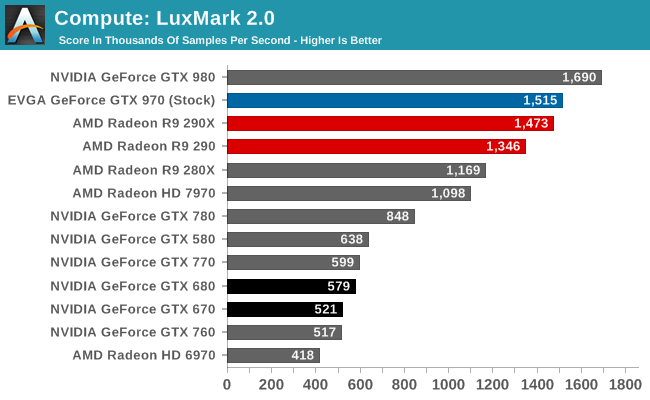
Thanks to GTX 980 taking the top spot here, GTX 970 still maintains a small lead over R9 290XU. So even with the GTX 970's weaker performance, it can still manage to outperform AMD's flagship in this case.
For our second set of compute benchmarks we have CompuBench 1.5, the successor to CLBenchmark. We’re not due for a benchmark suite refresh until the end of the year, however as CLBenchmark does not know what to make of GTX 980 and is rather old overall, we’ve upgraded to CompBench 1.5 for this review.
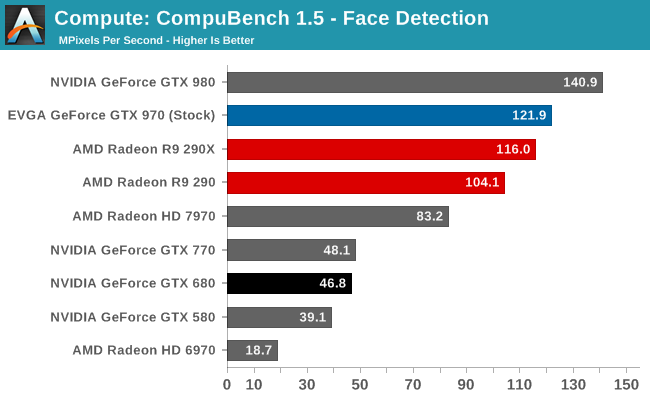
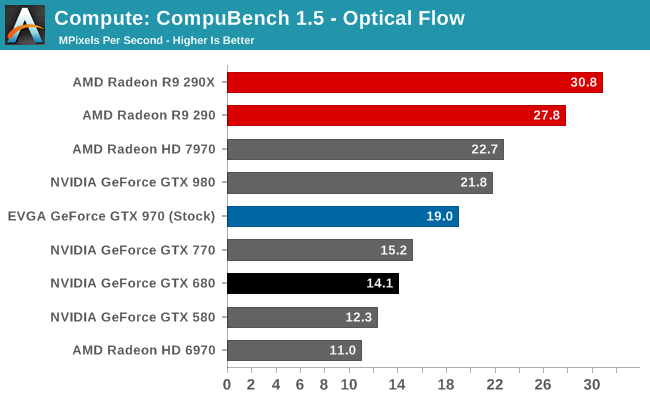
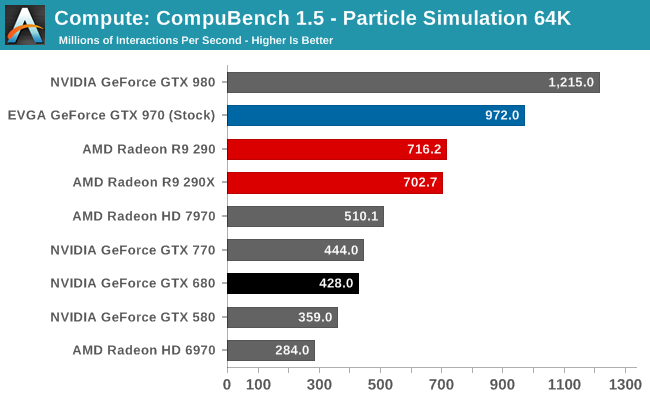
In the cases where the GTX 980 does well, so does the GTX 970. In the cases where the GTX 980 wasn’t fast enough to top the charts, the GTX 970 will be similarly close behind. Overall compared to AMD’s lineup we see the whole gamut, from a tie between the GTX 970 and R9 290XU to victories for either card.
Our 3rd compute benchmark is Sony Vegas Pro 12, an OpenGL and OpenCL video editing and authoring package. Vegas can use GPUs in a few different ways, the primary uses being to accelerate the video effects and compositing process itself, and in the video encoding step. With video encoding being increasingly offloaded to dedicated DSPs these days we’re focusing on the editing and compositing process, rendering to a low CPU overhead format (XDCAM EX). This specific test comes from Sony, and measures how long it takes to render a video.
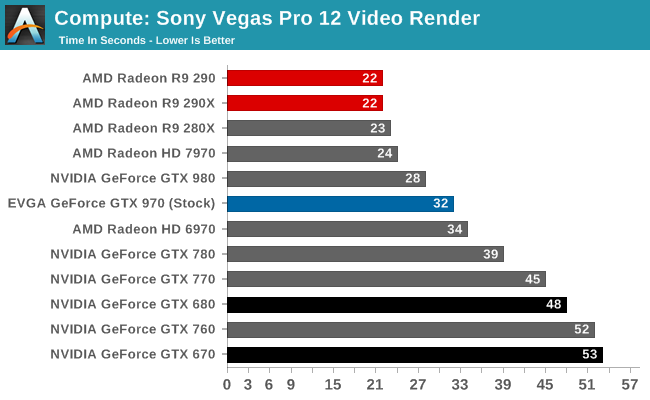
As expected, GTX 970 sheds a bit of performance here. AMD still holds a lead here overall, and against GTX 970 that lead is a little bit larger.
Moving on, our 4th compute benchmark is FAHBench, the official Folding @ Home benchmark. Folding @ Home is the popular Stanford-backed research and distributed computing initiative that has work distributed to millions of volunteer computers over the internet, each of which is responsible for a tiny slice of a protein folding simulation. FAHBench can test both single precision and double precision floating point performance, with single precision being the most useful metric for most consumer cards due to their low double precision performance. Each precision has two modes, explicit and implicit, the difference being whether water atoms are included in the simulation, which adds quite a bit of work and overhead. This is another OpenCL test, utilizing the OpenCL path for FAHCore 17.
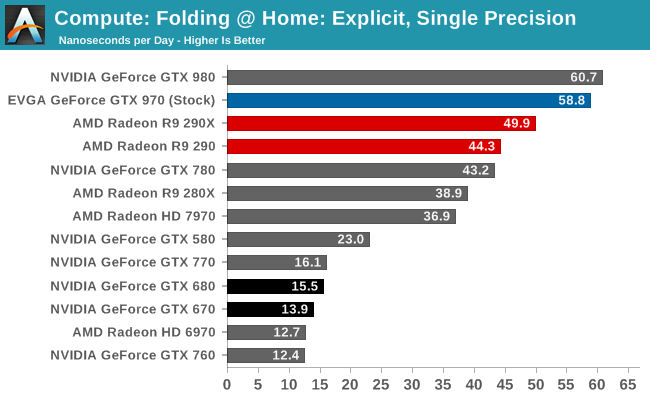
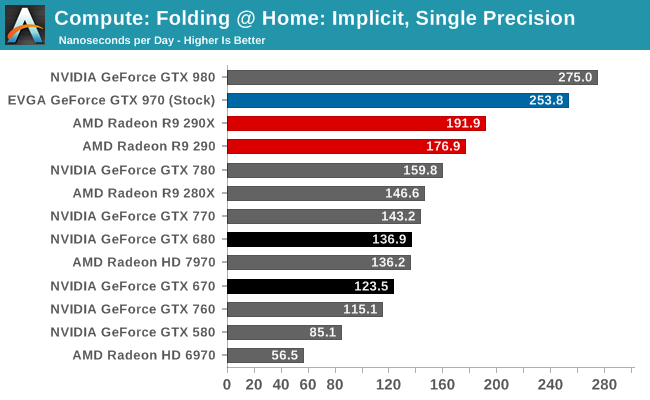
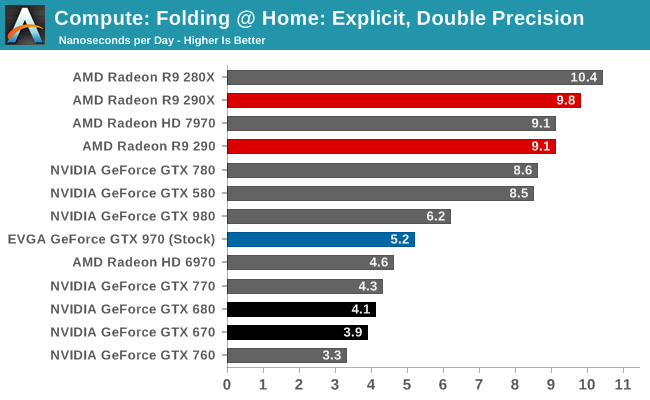
With the GTX 980 holding such a commanding lead here, even with the GTX 970’s lower performance it still is more than enough to easily beat any other card in single precision Folding @ Home workloads. Only in double precision with NVIDIA’s anemic 1:32 ratio does GTX 970 falter.
Wrapping things up, our final compute benchmark is an in-house project developed by our very own Dr. Ian Cutress. SystemCompute is our first C++ AMP benchmark, utilizing Microsoft’s simple C++ extensions to allow the easy use of GPU computing in C++ programs. SystemCompute in turn is a collection of benchmarks for several different fundamental compute algorithms, with the final score represented in points. DirectCompute is the compute backend for C++ AMP on Windows, so this forms our other DirectCompute test.
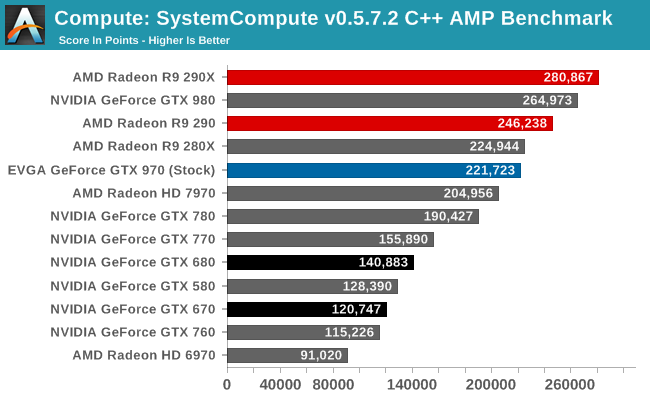
Recently this has been a stronger benchmark for AMD cards than NVIDIA cards, and consequently GTX 970 doesn’t enjoy quite the lead it sees elsewhere. Though not too far behind R9 280X and even R9 290, like GTX 980 it can’t crunch numbers quite fast enough to keep up with R9 290XU.










155 Comments
View All Comments
dibbademevos - Tuesday, September 30, 2014 - link
hidibbademevos - Tuesday, September 30, 2014 - link
hi
SkyBill40 - Wednesday, October 1, 2014 - link
Having always been an MSI guy, I've not really considered going with another vendor... until now. This looks like a nice card which also happens to conveniently match my color scheme whereas the red coloring of the MSI Gaming line sadly does not. Still, the overclocks are pretty much a wash and the only real differences seem to be in the cooling solution. The ACX 2.0 seems to be on par with the MSI, so I suppose I could go either way.Oxford Guy - Saturday, October 4, 2014 - link
Is it the case that the ACX card uses only 4 power phases which is why overclocking it beyond the factory setting isn't going to work very well? There is no mention of power phases in your article.Kanuj5678 - Sunday, October 5, 2014 - link
GTX 970 beats the shit out of everything and that too in style with lowest TDPCheers
Kanuj
ambientblue - Wednesday, April 29, 2015 - link
Enthusiasts dont care about TDP that much. The 290x is held back by HSF cooling (Uber mode is actually stock advertised speeds) while the GTX 970 is not. Water-cool the 290x and OC it to 1200mhz and it will match a 980, surpassing it at 4K resolution easily.igyb - Tuesday, October 7, 2014 - link
Is the gtx 970 just an underclocked 980? i might just get that because i cant really afford a 980.Kimtastic - Tuesday, October 21, 2014 - link
Dear Ryan,I had a MSI GTX 970 and found that under heavy load the core clock was fluctuating and causing FPS drops. After having read this article, I now understand that its due to the TDP limit. Is this something that will/can be fixed or something permanent?
I would be grateful for your advice. Many thanks.
hoohoo - Thursday, October 23, 2014 - link
Thank you for including an HD7970 in the test!Shoiti2 - Monday, November 3, 2014 - link
Those price are damn cheap. I would say, buying a gtx980 in the U.S wouldnt even buy a gtx 970 in Brazil. I'm living in Brazil right now and ordered an evga gtx 970 sc. Ok, how much did i pay for the gtx 970!! Nothing less than $750USD.the Gtx 970 at $750USD still very cheap for us Brazilian, the world's most expensive country.
The evga gtx 980 is costing around $1100USD, not kidding, check for yourself.